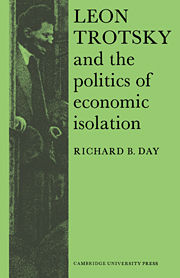Book contents
- Frontmatter
- Contents
- Preface
- Part one THE DILEMMA OF ECONOMIC ISOLATION
- Part two THE POLITICS OF ECONOMIC ISOLATION
- 4 The search for a new faith
- 5 Socialism in One Country
- 6 Trotsky's alternative
- 7 Trotsky's attack on socialism in a ‘separate’ country
- 8 Integrationism in defeat and exile
- Bibliography
- Notes
- Index
- CENTRE FOR RUSSIAN AND EAST EUROPEAN STUDIES UNIVERSITY OF TORONTO
8 - Integrationism in defeat and exile
Published online by Cambridge University Press: 25 October 2009
- Frontmatter
- Contents
- Preface
- Part one THE DILEMMA OF ECONOMIC ISOLATION
- Part two THE POLITICS OF ECONOMIC ISOLATION
- 4 The search for a new faith
- 5 Socialism in One Country
- 6 Trotsky's alternative
- 7 Trotsky's attack on socialism in a ‘separate’ country
- 8 Integrationism in defeat and exile
- Bibliography
- Notes
- Index
- CENTRE FOR RUSSIAN AND EAST EUROPEAN STUDIES UNIVERSITY OF TORONTO
Summary
At the beginning of this study it was proposed that Trotsky's appraisal of Soviet economic policy should be seen in terms of two periods: War Communism and the mid-1920s. In both of these periods, as we have now shown, the uniqueness of Trotsky's views centred on the question of Russia's relation with Europe. At each stage of the revolution's development he found himself either tacitly or explicitly in conflict with the majority opinion in the Bolshevik leadership. When Trotsky thought Russia had no alternative but isolation, his opponents favoured integration. When Trotsky endorsed integration, others advocated Russia's isolation.
Taking into consideration the political tensions of the time it is tempting to attribute this odd dialectic to either conscious or unintentional personal perversity on Trotsky's part. Several of the more prominent members of the opposition eventually came to this conclusion, believing that collectivization and the first five-year plan removed all of the substantive causes of earlier disputes. Systematic repression of the kulak, the elimination of the NEP-men, and massive investments in industry: together these policies seemed not merely to fulfil the opposition's demands, but also to guarantee Russia's march to socialism. Even Isaac Deutscher, in his well-known biography, suggested that Trotsky had become ‘the authentic inspirer and prompter’ of Stalinist industrialization. To most contemporaries it seemed that Stalin had seen the error of his own, and particularly of Bukharin's ways, thus making possible a political reconciliation between the party's left and centre.
- Type
- Chapter
- Information
- Leon Trotsky and the Politics of Economic Isolation , pp. 179 - 192Publisher: Cambridge University PressPrint publication year: 1973



